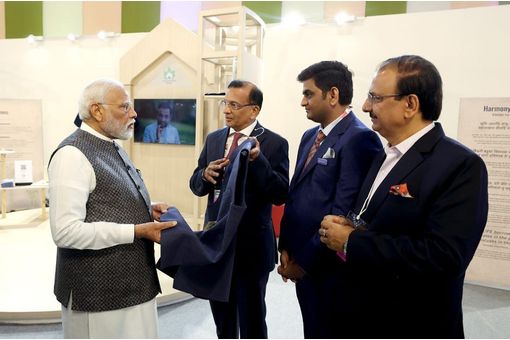Interviews
Govt to reduce excise duty on textile machineries to boost production - ASSOCHAM
30 May '09
4 min read
The Associated Chambers of Commerce and Industry of India (ASSOCHAM) has proposed reduction in excise duty for textile machineries from 14% to 8% with a view to encourage the indigenous demand and production substantially.
In a proposal submitted to the Finance Ministry, ASSOCHAM has pointed out that since the textile industry is not falling under CENVAT, the existing excise duty @ 14% is not modvatable for the textile industry. This unfortunately has unnecessarily been increasing prices of indigenous textile machinery when supplied to domestic textile industry. A reduction to the level of 8% would reduce cost of machinery substantially and shall become competitive.
“The indigenous textile machinery attracts 14% excise duty in general, plus 3% VAT plus 5 to 8% local taxes plus 2% octroi plus 2% transaction costs. Total amount of duties and taxes thus works out to anywhere 24 to 29%. The machine maker has to pay similar duties & taxes on bought out components & accessories and all incidences of such payments are not modvatable”, pointed out the ASSOCHAM's proposal.
The total domestic production of textile machinery is at the level of Rs.3000 crore per annum. The majority of the manufacturers are under Small and Medium scale (SMEs). As such, the amount of excise duty contribution by the textile engineering industry to the government exchequer @ 14% would not be more than Rs.200 crores. However, if the excise duty is reduced to 8%,there would be more demand for indigenous textile machinery and the production would increase substantially. Further, the SMEs which are avoiding the payment of excise duty within the existing framework are likely to come under the ambit of excise duty as the net duty payable under MODVAT would be less”.
The ASSOCHAM has also pointed out that floor level of customs duty on capital goods should be charged @ 7.5%. The rate of duty on raw materials, parts, components & accessories should be less than that on complete machinery, in general, at least to 5%.
The Chamber has pointed out that the duty on imported textile machinery items has been reduced to 7.5%. There is a concessional duty of 5% on specified textile machinery.
However, duty on some raw materials, parts, components & accessories for the manufacture of these machines, viz. rubber components & raw materials, ceramic compactor, seamless steel tubes, screws, nuts & bolts and bearings is attracting 10% customs duty. All items of textile machinery should attract a uniform rate of duty of 7.5% and this rate should not be lowered further.
The ASSOCHAM has also advocated the need to have a level playing field and as such, the customs duties for raw materials, components and accessories for the manufacturer of textile machinery, in general, should be less than 7.5% or 5% as the case may be. This is required to avoid the inverted duty structure.
Mr. Rawat also demanded uniform treatment to the domestic suppliers of machinery to EPCG licence holders and 100% EoU as both are deemed export. The facility given to EPCG licence holders exempting from countervailing duty on machines imported should also be given to indigenous machinery manufacturers in excise duty against supply of textile machines to the EPCG licence holders.
In a proposal submitted to the Finance Ministry, ASSOCHAM has pointed out that since the textile industry is not falling under CENVAT, the existing excise duty @ 14% is not modvatable for the textile industry. This unfortunately has unnecessarily been increasing prices of indigenous textile machinery when supplied to domestic textile industry. A reduction to the level of 8% would reduce cost of machinery substantially and shall become competitive.
“The indigenous textile machinery attracts 14% excise duty in general, plus 3% VAT plus 5 to 8% local taxes plus 2% octroi plus 2% transaction costs. Total amount of duties and taxes thus works out to anywhere 24 to 29%. The machine maker has to pay similar duties & taxes on bought out components & accessories and all incidences of such payments are not modvatable”, pointed out the ASSOCHAM's proposal.
The total domestic production of textile machinery is at the level of Rs.3000 crore per annum. The majority of the manufacturers are under Small and Medium scale (SMEs). As such, the amount of excise duty contribution by the textile engineering industry to the government exchequer @ 14% would not be more than Rs.200 crores. However, if the excise duty is reduced to 8%,there would be more demand for indigenous textile machinery and the production would increase substantially. Further, the SMEs which are avoiding the payment of excise duty within the existing framework are likely to come under the ambit of excise duty as the net duty payable under MODVAT would be less”.
The ASSOCHAM has also pointed out that floor level of customs duty on capital goods should be charged @ 7.5%. The rate of duty on raw materials, parts, components & accessories should be less than that on complete machinery, in general, at least to 5%.
The Chamber has pointed out that the duty on imported textile machinery items has been reduced to 7.5%. There is a concessional duty of 5% on specified textile machinery.
However, duty on some raw materials, parts, components & accessories for the manufacture of these machines, viz. rubber components & raw materials, ceramic compactor, seamless steel tubes, screws, nuts & bolts and bearings is attracting 10% customs duty. All items of textile machinery should attract a uniform rate of duty of 7.5% and this rate should not be lowered further.
The ASSOCHAM has also advocated the need to have a level playing field and as such, the customs duties for raw materials, components and accessories for the manufacturer of textile machinery, in general, should be less than 7.5% or 5% as the case may be. This is required to avoid the inverted duty structure.
Mr. Rawat also demanded uniform treatment to the domestic suppliers of machinery to EPCG licence holders and 100% EoU as both are deemed export. The facility given to EPCG licence holders exempting from countervailing duty on machines imported should also be given to indigenous machinery manufacturers in excise duty against supply of textile machines to the EPCG licence holders.
Popular News
Leave your Comments
Editor’s Pick
Yohan Lawrence
Joint Apparel Association Forum (JAAFSL)
Dr. Michael Duetsch & Man Woo Lee
UPM Biochemicals and Dongsung Chemical
































-Ltd..jpg?tr=w-120,h-60,c-at_max,cm-pad_resize,bg-ffffff)





.jpg?tr=w-120,h-60,c-at_max,cm-pad_resize,bg-ffffff)
.jpg?tr=w-120,h-60,c-at_max,cm-pad_resize,bg-ffffff)






